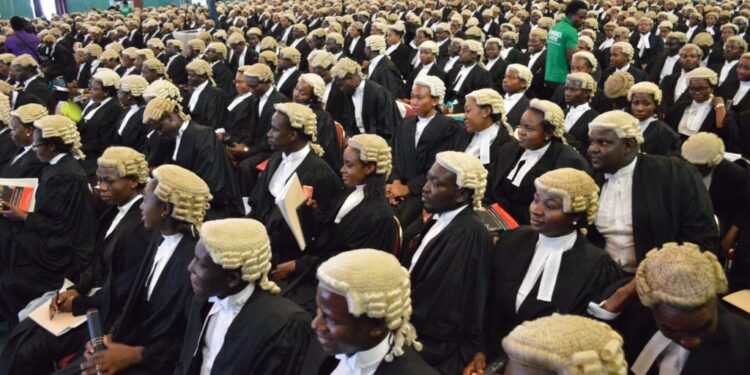Nigeria’s legal system is facing significant challenges that hinder its effectiveness and erode public trust.
The Council of Legal Education, which is the body in charge of the Nigerian Law School said 2,736 students participated in the re-sit examination.
A statement issued by the Director-General of the Nigerian Law School, Olanrewaju Onadeko revealed that out of the 2,736 students who participated in the re-sit examination, only 1,648 were successful. They will be called to the Bar with a pass.
However, 990 of the students were not so lucky because they again failed, even as ninety-eight of the students managed to escape with a conditional pass.
It announced that out of the 2,852 regular students who sat for its May 2015 Bar Final Examinations, only four of them came out with First Class honors.
Every year, Tens of Hundreds graduate from the law school and become certified legal practitioners.
In most cases, children of Presidents, Governors, lawmakers, Prominent and the ordinary citizens attend the same school and practice in other cases in the same legal structural system.
Despite producing skilled lawyers, the country struggles with corruption, inefficiency, lack of access to justice, and disobedience to the rule of law.
These graduates who are now in the labor markets are either linked with esteemed connections as an executive, judiciary or local government power stakeholders.
They are basically responsible for the law they make but fondly disobey it during implementation stages.
Key actors are the Governors who will never allow the supremacy of the law sail, instead flout all jurists’ authentication of the law when it does not favor them.
They make the world believe that they are above the law.
The governor’s attitude towards the rule of law has been a concern, with instances of disregard for judicial decisions and lack of tolerance for freedom of expression.
They dominate and close all legal road maps, steering against their stance, using thugs to perfect their acts.
Financial influence is another major problem, where the wealthy can manipulate the law to their advantage, perpetuating the notion that the law is made for the poor.
We have witnessed cases where the Judge’s decision in politics, and other areas will wrongly favor the influential personality.
For instance, the issue of local government autonomy where council chairmen have won their cases in court, after they were forcefully evicted, but the rule of law was never obeyed by the governors. Edo is a classic example of this aberration.
Corruption and evil political dominance are a major obstacle to justice in Nigeria, affecting all aspects of the legal system, from law enforcement to the judiciary.
Bribery and graft undermine the integrity of legal proceedings, and judicial officers sometimes prioritize personal gain over their duties.
The Nigerian justice system is notorious for its slow pace, with cases often lingering for years. This inefficiency is exacerbated by bureaucratic hurdles, lack of resources, and inadequate infrastructure.
The military regimes that ruled Nigeria for several decades further eroded the rule of law, introducing a culture of impunity and disregard for human rights and its consequences.
This period entrenched corruption and inefficiency in the justice system.
Today, Nigeria annually produces legal practitioners but does not obey court judgments.
From the local government set up to the Federal government, no one obeys the rule of law.
Despite the return to democracy in 1999, which brought new opportunities for reform and the promotion of human rights, the government is far away from retaining the rule of law.
Again, many Nigerians cannot afford legal representation, and the legal system is often inaccessible to and rigged against the marginalized communities.
High legal fees, inadequate legal aid, and limited awareness of rights and remedies further compound this problem.
Impact on the Rule of Law is hinged on the widespread corruption and inefficiency leading to a significant erosion of public trust in legal institutions.
Citizens increasingly view the justice system as biased and ineffective.
Nigeria’s legal system requires comprehensive reforms to address these challenges and promote transparency, accountability, and efficiency.
The Government is urged, if possible, to declare a state of emergency on the rule of law, take crucial steps to strengthen the independence of the judiciary, enhance capacity-building and foster a culture of accountability.
By prioritizing justice system reform, Nigeria can work towards a more equitable and just society, re-establishing faith in the legal system and promoting democracy and human rights for all citizens



































